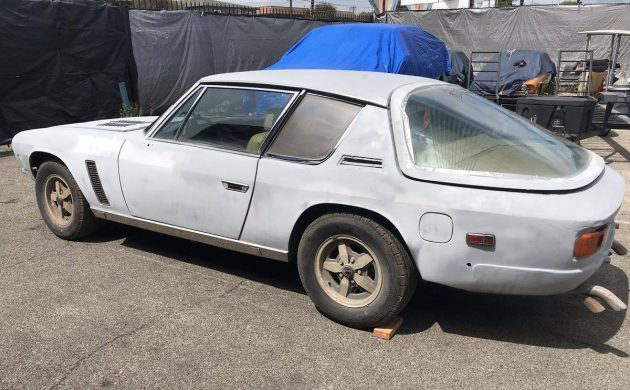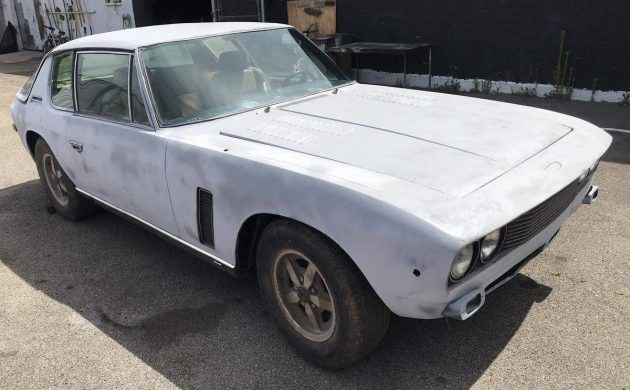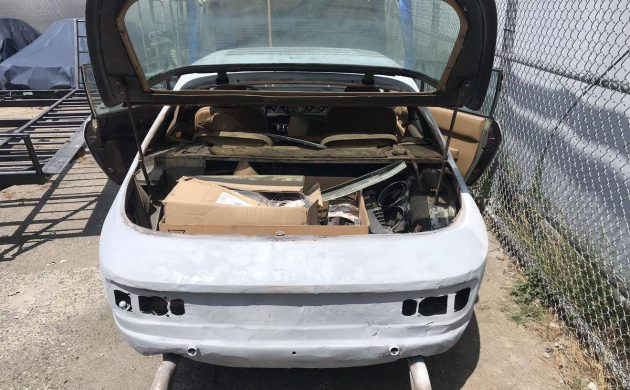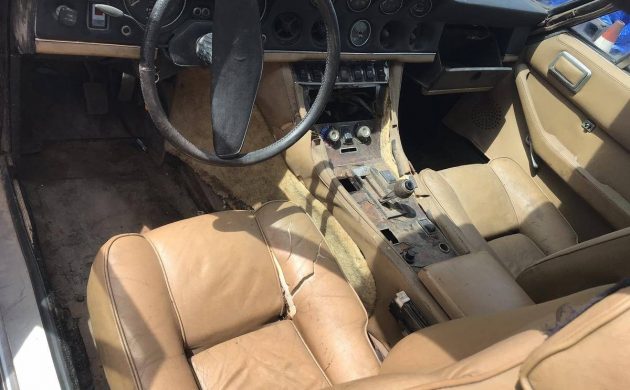440-Powered 1972 Jensen Interceptor Project
The Jensen Interceptor was a relatively low volume grand touring machine that was built in England for more than a decade. The cars relied on engines and transmissions from Chrysler for propulsion. Some 6,407 of them were produced in three series during their run, with 1,047 in 1972 alone, being one the car’s strongest sales years. We don’t know how many of these automobiles made it to the States, but many of them did. This 1972 edition saw limited use before going undercover in 1976. It needs restoration, but as it’s said to be 99% complete, hunting for rare parts might not be daunting. It’s available in Encino, California and here on Hemmings Classifieds for $9,995. Thanks, Jt, for finding this gem for us!
Jensen Motors brought the Interceptor to life in 1966, hand-built at the Kelvin Way Factory in West Bromwich, England. While Jensen had used glass-reinforced plastic for its body panels in the past, the new Interceptor would employ a steel body-shell. The body itself was designed by an outside firm but produced in-house. To many Americans, the Jensen was reminiscent of the early Plymouth Barracudas because of its large, curving wrap-around rear window that was also a tailgate. Initially, Jensen used Chrysler’s 383 cubic inch V-8 and TorqueFlite automatic transmission driving the rear wheels, but later shifted to the larger 440 engine. As it was detuned for use with unleaded gasoline, the 440 only produced 250 to 280 hp SAE net depending on model year. Jensen hit a financial wall in 1975 (as did many automobile manufacturers) due to the energy crisis and economic downtown. The company went into receivership for a while and then production of the Interceptor came to an end in 1976. Source: Wikipedia.
This third series Interceptor III from 1972 is said to have just 4,000 miles on it. It was parked in a garage in 1976 and there it’s been ever since. Some work has been done on the body (which generally looks solid), but we don’t know if this happened before, during or after it emerged from captivity. There are a few light dents and the possible existence of bondo in the rear end. The photos and seller indicate the car is largely complete and rust-free. The interior looks good, as well, and may only need a good cleaning to be presentable again.
The 440 V-8 and automatic transmission are said to be numbers-matching, but there is no indication if the car runs. So, we must assume that it does not and will require some mechanical attention. Ironically, we understand that the 440s were slower than its 383 brethren because the engines had been so restricted to meet emissions standards of the day. The internet says that Interceptor III’s were well-built cars and pricey for their day, built for crossing Europe at high speeds. Fuel economy was poor and likely hurt the car’s sales potential in an era of fuel-conscious car buyers, even if money was not an object (supply was).
The resale value of these cars is all over the place. There are several Interceptors III’s on the internet and they run from $20,000 to nearly six figures, condition, and model years being the determinant. The less constrained 383’s may add a few bucks as well as being a convertible vs. a coupe). If you’ve had your heart set on one of these cars and don’t mind restoring it, this might be a good buy. The fact that the drivetrain was made by Chrysler will make the job easier.
Auctions Ending Soon
 2006 Ford Mustang Saleen S281 SCBid Now11 hours$15,000
2006 Ford Mustang Saleen S281 SCBid Now11 hours$15,000
 2002 Subaru Impreza WRXBid Now3 days$333
2002 Subaru Impreza WRXBid Now3 days$333
 1975 Chevrolet Corvette ConvertibleBid Now3 days$3,000
1975 Chevrolet Corvette ConvertibleBid Now3 days$3,000
 1964 Ford F-100 Camper CustomBid Now3 days$2,000
1964 Ford F-100 Camper CustomBid Now3 days$2,000
 2006 Jeep Wrangler SportBid Now5 days$10,500
2006 Jeep Wrangler SportBid Now5 days$10,500






Comments
A neighbor of mine in so-cal had a jensen and it always seemed to have something wrong with it. Always would cost him an arm and a leg to get it fixed. Never been a fan of that car.
Parts still available. Someone bought the company and still makes them.
It’s a shame that Chrysler didn’t make the electronics which were usually a nightmare
3995 MILES !!
I think I went to high school with the owner ; she told at least a dozen of us that we were her first .
A 1972 car parked in 1976. “Possible Bondo in the rear end”. 3995 miles. Rear window held in with duct tape.
“Daddy, Daddy, tell me another fairy tale!”
These are really something special inside. Lots of fun to drive and ride in. The rear seat is the place to be and relax.
Having no rust is a big plus. These are hand made and no two cars have the same body panels. Often lent a hand to a friend with one. The car was a lot of work to keep on the road. Number of miles driven / turns of the wrench was similar to my Europa. Both hand built cars. The lotus was light weight and things tended to rattle or tear apart. The Interceptor was complex and not totally sorted. When something went wrong it would take forever to trace down the fault.
Expect to need five cows for enough leather to recover the interior. Expect to pass very few gas stations without filling up. Expect to spend hours tracing wires. Expect to be able to go into any NAPA store for parts. Expect to absolutely love cruising down the highway. These are a level up from my ‘66 Jag salon. Don’t feel like they were built to a price.
Jag saloon not salon. Should know better than to use my phone
I’m guessing it was parked when it was rear ended in 76 and the owner spent the last 44 years redoing the rear end with paper machè.
I dated a girl when these came out who was named Carol Jensen. I used to laugh that if I ever made it big (I didn’t) I would buy her one. She liked the idea, but didn’t stay around long enough to ever collect on the car. Too bad, she was even prettier then this car, a lot prettier.
I seen a couple of these back in the day.
Oddballs to say the least.
IMHO, the owner shoulda taken it to a body shop and then sold it.
At least he didn’t let someone get away with the powertrain.
Can you imagine seeing a ‘39 Dodge with a Jensen power plant at Coffee & Cars?